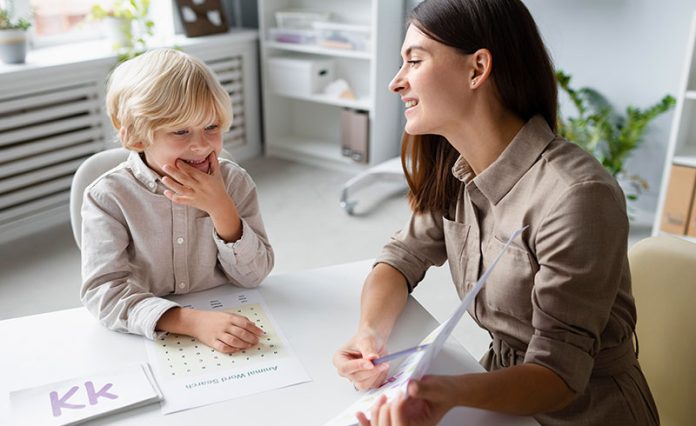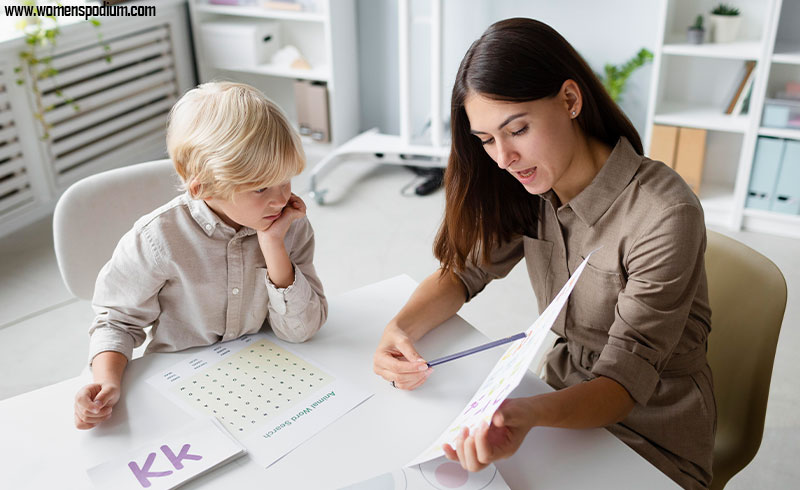
Words occupy the most influential place in our communication. And language is one of the most powerful tools that humans have at their disposal. Indeed then, speaking becomes much more than just a life skill; it becomes a medium to express ourselves and present our realities to the world. Children as young as six months old babble to communicate their needs; and by the time they are 12 to 15 months old, they start forming words and phrases. However, some children do not follow this timeline and later they develop speech delays. And this certainly leave parents worried and sometimes in a tense situation. So let’s understand first what speech delays mean, how important is speech therapy, and finally, how speech therapy for toddlers work?
What are Speech Delays?

Speech delay, also known as alalia, refers to the delay in using mechanisms that produce speech. This may or may not be accompanied by language delay, which refers to the ability to comprehend and use language. Speech delay can result from conditions including but not limited to autism, dyslexia, cerebral palsy, or other speech-specific disorders.
Before we proceed, it is necessary to note that children with speech delays are not ‘abnormal or problematic’. Changing the narrative around speech delay can help in reducing the stigma around seeking help and allowing children with such delays to express themselves fully, using other mediums. It is also important to remember that speech delays or other such conditions do not reflect parental failure. Therefore, it is essential that everybody must be treated with respect and inclusion. In all this chaos, every as family parent starts worrying when their child deals with delay in speech, struggling with this below shared question:
So, at what age should I be worried about my child’s speech?

Every child grows differently. However, there are some developmental milestones which every child must fulfil by a particular age. In terms of speech, we expect a child to start making sounds like cooing by the age of 3 months. By six months, a child starts babbling, by 12 months, it starts speaking a few words, and by 15 months, the child communicates in small phrases. Other developmental milestones include learning new words from people around them, imitating elders’ sounds, and trying to communicate using language. While these may not be the exact timeline your child follows, be sure to look out for excessive delay or irresponsive behavior. These may hint at a larger problem that needs support.
What are the Signs of Speech?

The most important sign of speech delays is not following developmental milestones. Other signs may include preferring gestures over vocalisations, not producing words or sounds spontaneously, not communicating beyond basic needs, not being comprehensible even to their immediate caregivers, etc. It is essential to look out for such signs and access help as soon as possible. The best way to seek support is through consulting your general physician, who can then guide you to a speech therapist.
What is Speech Therapy?

Speech therapy is the assessment and treatment of communication disorders, usually done by a speech-language pathologist, also known as a speech therapist. The speech therapist uses different techniques to provide support and develop communication skills in children with different speech-related conditions. Depending on your child’s needs, the speech therapist can set a line of treatment with your consent. For young children, speech therapy can take place in a classroom, in a small group, or a one-on-one setting depending upon your choice. Speech therapy is known to work successfully when started early and practised at home with the involvement of a caregiver.
How to do Speech Therapy for Toddlers at Home?
While a speech therapist can provide adequate support and technique, it is important for caregivers to continue speech training practices at home as well. These practices help the child grasp better and respond well to speech therapy. While your speech therapist is the best guide for you, here are some tips that may help you practice speech therapy with your toddler; besides worrying, it is better to work on speech therapy for toddlers at home.
1. Use Play

“Play is the chief vehicle in the development of imagination and intelligence, language, social skills, and perceptual-motor abilities in infants and young children.” – (Frost, 1992).
There is nothing better than play to stimulate your toddler’s brain. Playing comes naturally to children, and therefore, when speech practices are offered in terms of play, they respond more effectively to them. If speech practices are treated like obligations or duties that the toddler has to perform, they may seem boring to the toddler. Therefore, make sure you integrate your speech practices into your toddler’s play routine.
2. Allow your Child to Take the Lead

Your speech therapist might suggest various speech practices that your toddler can use to develop their skills. However, when you practice at home, try to let your toddler take the lead. Lay out different activities in front of your toddler and let your toddler choose their course.
3. Use Imitation Techniques

We learn a large part of our speech through imitation. Therefore, make repeated sounds that the child can imitate. This will help them to build associations between speech and action and encourage them to use the exact words when they encounter such activities in the future. For example, you could say “1,2,3, throw” before you throw a ball and then invite your toddler to do the same.
4. Link Actions to Words

Speech practices can be found in every seemingly small incident. Pointing out things around the home, speaking out loud when the child performs an action or naming different actions for the child can allow your child to retain words for their surroundings. The more you speak to your child every day, the more opportunities you provide to help them pick up words.
5. Retain the Human Touch

While television or gadgets can be great tools for learning, a toddler benefits most from the human touch. Playing with your child or taking the time to talk to your child regularly will allow them to link speech to a safe, loving and comfortable environment. Personalized attention from the caregiver enables the child to retain information much more effectively. Therefore, your love, support and engagement are the most valuable gadgets your child can find.
6. Bring Variety

Use a range of material and techniques to make your child’s speech practices interesting for them. Use songs or rhymes to inculcate more vocabulary through tunes, or read picture books together before you sleep. Similar activities can get boring for children. Speech therapy will be a test of your creativity, but it will be worth it when your child starts communicating effectively.
7. Have Fun!

This might be the essential piece of advice when it comes to speech therapy for toddlers. If caregivers look at speech therapy as an obligation or necessity for their child, they can miss out on the opportunities to create close bonds with their child. These activities can bring plenty of quality time for the child and the caregiver to bond and make some beautiful memories along the way. So, don’t forget to have fun with your child while you train them word for word.
These were some of the basic tips to get you started with speech therapy for toddlers at home. However, it is crucial to consult your speech therapist for a plan of action that best suits your toddler. Speech therapy can be a daunting, intimidating and exhausting journey. You might need a lot of resilience and hard work. But at the same time, it may also be one of the best journeys of your life, giving you a chance to bond with your child exceptionally and memorably. Do remember that every toddler is different, and therefore, every child’s speech therapy journey will be different too.
Also Read: Nurturing the future generation with practical parenting skills is what every parent needs.





